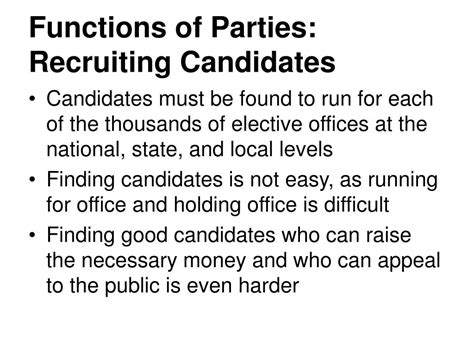How Do Political Parties Recruit Candidates
Ronan Farrow
Apr 04, 2025 · 3 min read

Table of Contents
How Do Political Parties Recruit Candidates?
Finding the right candidates is crucial for any political party's success. It's a multifaceted process involving various strategies and considerations. Let's delve into the methods political parties employ to recruit their candidates.
Identifying Potential Candidates: The Talent Search
The initial phase focuses on identifying individuals who align with the party's ideology and possess the necessary qualities for a successful campaign. This "talent search" can involve several approaches:
Networking and Outreach:
-
Party Members and Activists: Existing members and active volunteers are often the first pool of potential candidates. Their dedication and grassroots experience make them valuable assets. Parties may hold internal meetings, surveys, and focus groups to gauge interest and identify promising individuals.
-
Community Leaders and Influencers: Individuals holding positions of influence within their communities, such as business leaders, educators, and religious figures, are sometimes approached. Their established reputation and community connections can boost a campaign.
-
Recruitment Drives and Initiatives: Parties may organize targeted recruitment drives, emphasizing specific demographics or skillsets they want to represent. This proactive approach can help diversify the candidate pool.
Identifying High-Potential Individuals:
-
Past Campaign Experience: Individuals with prior campaign experience, whether as volunteers, organizers, or candidates, are highly valued. This experience provides invaluable knowledge of campaigning strategies and election mechanics.
-
Professional Background and Skills: Specific professions, such as law, business, or public relations, can equip candidates with skills vital for political success. Strong communication, negotiation, and leadership abilities are highly desirable.
-
Public Speaking and Charisma: The ability to connect with voters and deliver compelling speeches is a crucial factor in a candidate's success. Parties look for individuals who can effectively communicate their message and engage audiences.
The Vetting Process: Ensuring Candidate Suitability
Once potential candidates are identified, a rigorous vetting process ensues. This is crucial to ensure the candidate aligns with the party's values and is capable of running a successful campaign.
Background Checks and Due Diligence:
-
Financial Scrutiny: Parties investigate candidates' financial history to uncover potential conflicts of interest or vulnerabilities that could be exploited by opponents.
-
Reputation and Public Image: A thorough review of a candidate's public image, including social media presence and past actions, is undertaken to identify any potential liabilities.
-
Legal and Criminal History: Background checks are conducted to uncover any legal issues or criminal records that could negatively impact the campaign.
Interview Processes and Assessments:
-
Formal Interviews: Candidates undergo formal interviews with party officials and campaign strategists to assess their suitability and political acumen.
-
Policy and Platform Alignment: The candidate's alignment with the party's platform and policies is carefully examined to ensure consistency.
-
Campaign Strategy Discussions: Candidates present their campaign plans and discuss their strategic vision with party leaders.
The Nomination Process: Securing the Party's Backing
The final stage involves the formal nomination process, where the party officially endorses a candidate to represent them in the election. This process can vary significantly depending on the party's structure and internal rules:
-
Primary Elections: Many parties utilize primary elections, where party members vote to select their preferred candidate. This allows for a democratic selection process, promoting internal party competition.
-
Conventions and Caucuses: Some parties employ conventions or caucuses, where delegates representing various party factions select the candidate. This can involve negotiations and compromises among different party wings.
-
Party Leadership Appointments: In some instances, the party leadership directly selects the candidate, a less democratic approach often used in parties with a more centralized structure.
Conclusion
Recruiting suitable candidates is a complex and demanding process involving extensive research, thorough vetting, and careful consideration of various factors. Successful recruitment strategies ensure the party selects individuals capable of effectively representing their interests and achieving electoral success. The process highlights the importance of aligning personal qualities, professional skills, and political ideology to create a strong and effective campaign.
Featured Posts
Also read the following articles
| Article Title | Date |
|---|---|
| How Do You Make Corn Dogs With Pancake Mix | Apr 04, 2025 |
| How Hard Is It To Move A Thermostat | Apr 04, 2025 |
| How Heavy Is A Car Door | Apr 04, 2025 |
| How Fast Can You Drive In 4a | Apr 04, 2025 |
| How Did I Get Fleas In My House Without Pets | Apr 04, 2025 |
Latest Posts
-
How Long Do Nightcrawlers Live In Fridge
Apr 05, 2025
-
How Long Do Mouthguards Last
Apr 05, 2025
-
How Long Do Microbead Hair Extensions Last
Apr 05, 2025
-
How Long Do Mach E Batteries Last
Apr 05, 2025
-
How Long Do Macarons Keep
Apr 05, 2025
Thank you for visiting our website which covers about How Do Political Parties Recruit Candidates . We hope the information provided has been useful to you. Feel free to contact us if you have any questions or need further assistance. See you next time and don't miss to bookmark.
